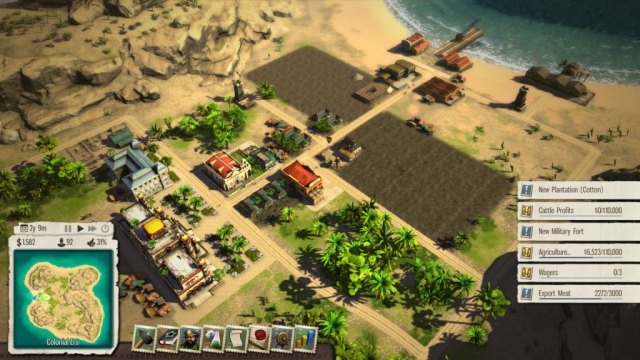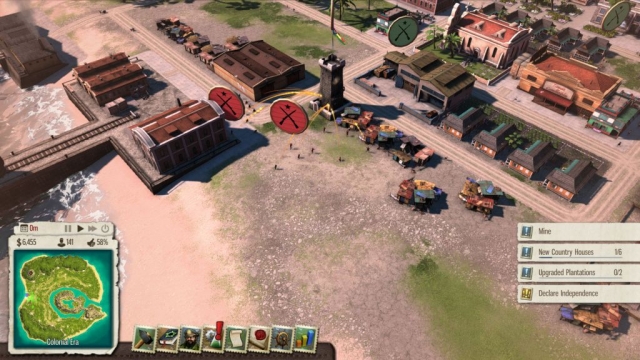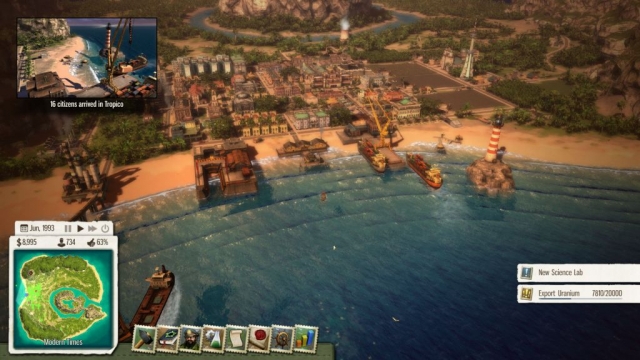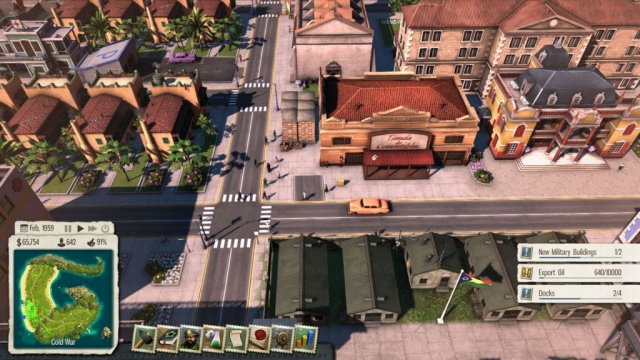Tropico 5
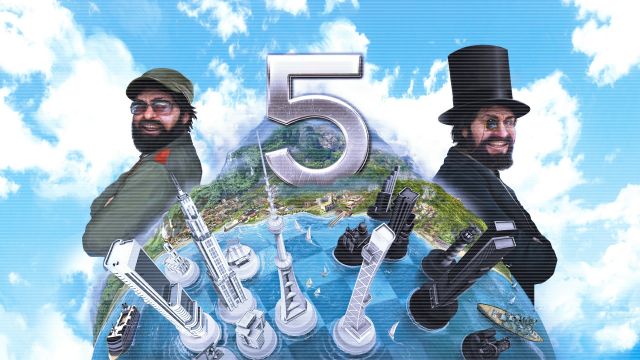
Outside of Tropico 2: Pirate Cove, all of the Tropico games have been about the same, with you taking on the role of El Presidente and running the show on a small Caribbean island. Tropico 5 is no exception. Developer Haemimont Games has added a lot of new features for you to enjoy — like research projects, distinct eras, dynasties, and a new look for buildings — but still, nothing about Tropico 5 is wildly different than its predecessors, which makes it yet another solid but derivative entry in the franchise.
If you’ve never played a Tropico game, your goal is to manage a small island. You have to keep your people happy by supplying them with food, employment, entertainment, housing, healthcare, and religion. You have to make money to keep your economy going, so you can construct new buildings and squirrel away some cash into your Swiss bank account. And you have to maintain a certain amount of popularity, both with your people and with foreign powers, so you can maintain your position. These objectives are completed over the course of years (probably over 100 years in a sandbox game), giving you lots of time to plan your moves and watch your island grow.
So what’s new? For starters, when you begin a scenario your island is mostly unexplored. Only the small area around your palace is known to you, and that’s the only place where you can construct buildings. To learn more about your island, you have to pay money to your soldiers so they go out and explore. This increases your building area and also exposes the resource nodes (like gold mines) available to you. The game no longer includes a friendly overlay showing you where resources are. You have to hunt around for them.
Also new is research. Some buildings, like libraries and colleges, provide you with research points, which you can use to unlock new buildings and options. Only college-educated workers can perform research, and research buildings are expensive (both to build and to maintain), so research adds a few complications to early life on your island. Probably the first thing you should research is “The Shovel,” which allows you to build mines. Since mining requires research and exploration, you can’t immediately start mining on your island. You have to survive for a while working your plantations, which is a change from the earlier games.
Another change is the addition of eras. You begin a game in the Colonial era, where you’re the appointed governor of the island. During this era you have to keep your host country happy (by completing tasks for them) so they extend your mandate. This era exists before 1914, so you don’t have a lot of buildings (like parking garages and television stations) available to you yet. To move on to the era — World Wars — you have to gain enough support on your island so you can declare your independence. From there you can also move on to the Cold War era and the Modern Times era. Each time you advance your era, you gain new buildings and options, and you have to deal with different “superpowers.” This works sort of like the timeline in Tropico 4: Modern Times.
You can also start a dynasty in Tropico 5. That is, instead of just having a single character to run your island, you can have an extended family of up to seven characters. Each character provides a bonus of some sort and can advance up to level 5. Nicely, you have to spend money from your Swiss bank account to raise a character’s level — finally giving you a good reason to put money there — but unfortunately the system by which you gain dynasty members is sort of goofy. Instead of marrying somebody and having children, you’re just randomly assigned new members from time to time.
Only your main character provides a global bonus for your island. The other dynasty members can only help out by acting as managers for buildings. In previous Tropico games, you could select your character and direct him to different businesses to make them work better for a while. But now in Tropico 5 that system has been replaced by managers, where you assign a manager to a building to give it a bonus. For example, a Supervisor character increases the effectiveness of a building, while a Landlord character increases the housing quality of nearby residences. Any of your citizens can be a manager, but most of your citizen managers are only level 1 or 2 while your dynasty members can reach level 5.
One significant change to the game is subtle. In previous Tropico games, the happiness level of your people determined if they’d vote for you or not. But now people vote with their faction, and this makes life more complicated. Part of the research process in the game involves developing a constitution for your island, and no matter what choices you make there, some factions will approve and some won’t. Early in the game the religious and military factions are dominant, and it’s easy to keep them happy, but then later the globalists start taking over, and they want exactly the opposite things. As a result, you might have more trouble staying elected than in the previous games, and you might actually have to resort to voter fraud — something that was ridiculously unnecessary in Tropico 4. It’s nice that Haemimont Games decided to make elections more difficult, but it’s weird when someone with 100% happiness votes against you and eventually turns into a rebel.
Other changes include new graphics for the buildings, new rules and balancing for the buildings (for example, police stations and fire stations have been combined into one, and country houses now include a garden, so their residents no longer need to be fed), a new trade ship system (for imports and exports), a new wages system (where buildings have payment tiers instead of being able to set wages directly), and a new multiplayer system (which is unfortunately almost unusable right now). Tropico 5 also comes with a new 15 scenario campaign, which is about as silly as ever, and which takes about 40 hours to complete.
Overall, I liked Tropico 5 about as much as the other Tropico games. It’s a solid city management sim. The problem is that even with the long list of changes, it still plays about the same as the earlier titles in the franchise. I mean, sure, having a dynasty makes things different, but fundamentally different? No. I’d probably get bored with Tropico if a new game came out every year, but it’s been three years since Tropico 4, and that’s about the right amount of time between games for me to still enjoy them even when they’re so similar.
Still, I’m in sort of a quandary about whether I’d recommend Tropico 5. There isn’t anything wrong with it, but it’s virtually the same game and has the same quality as its predecessors, and you can currently buy all four of the earlier games for the same price as Tropico 5. If you’ve never tried a Tropico game before, then I’d suggest playing Tropico 4 first and going from there. If you have played the other Tropico games, and if the similarities haven’t bothered you yet, then there isn’t any reason not to give Tropico 5 a whirl as well.
Reviewed By: Steven Carter
Publisher: Kalypso Media
Rating: 77%
——————————————————————————–
This review is based on a digital copy of Tropico 5 for the PC provided by Kalypso Media.
 Game Over Online
Game Over Online